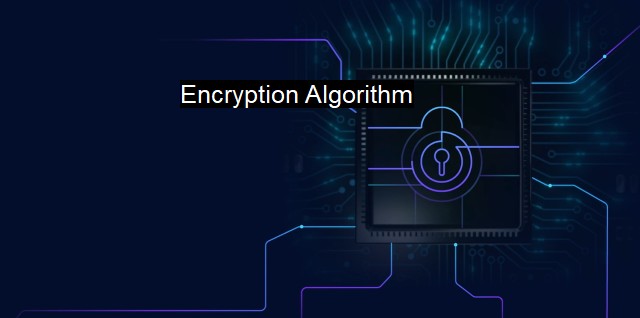What is Encryption Algorithm?
The Importances of Using Encryption Algorithms in Cybersecurity and Prevention against Cybercrime
In the realm of cybersecurity and antivirus technology, the term "Encryption Algorithm" plays an integral and central part. an encryption algorithm is a set of mathematical procedures or instructions defined for performing encryption and decryption, which are highly crucial in securing data. Encryption is a process that converts original data, also known as plaintext, into coded data, or ciphertext, by using an algorithm and an encryption key. The purpose of the encryption process is to hide data and ensure confidentiality during transmission over the internet or storage on systems, thereby preventing unauthorized access or disclosure.An encryption algorithm takes the original information and transforms it into a seemingly incomprehensible set of characters in a methodical and systematic way. This coded input can only be reverted to its original form by decryption, a process that involves another set of mathematical procedures but in reverse and requires a decryption key.
The robust security and confidentiality that encryption algorithms provide are pivotal in the sphere of cybersecurity and antivirus software. Cyber attackers often deploy harmful strategies aimed at stealing confidential information, launching malware, or interrupting digital communications. Strong encryption algorithms can counter these threats by ensuring the data is ultimately unreadable and therefore worthless to malicious actors.
There are two primary types of encryption algorithms: symmetric and asymmetric. Symmetric encryption algorithms use the same key for both encryption and decryption processes. Simplicity, ease of design, and faster computations are among their compelling benefits. Examples include DES (Data Encryption Standard), AES (Advanced Encryption Standard ), RC4, and Blowfish. the challenge with symmetric encryption is that if the key is lost, the data becomes completely inaccessible.
On the other hand, asymmetric encryption, also known as public-key encryption, uses two different keys. It utilizes one public key for encryption, available to everyone, and a private decryption key kept secret by the receiver. This encryption renders key sharing unnecessary and provides enhanced security. it requires more computational resources and possesses more complex algorithms such as RSA (Rivest–Shamir–Adleman), ECC (Elliptic Curve Cryptography), and ElGamal.
Antivirus software often carries the responsibility of shielding sensitive information from being compromised. It depends on encryption algorithms to lock away users' data and send it securely through networks. If a virus does infiltrate a system, the encrypted files ensure that the virus cannot tap into the information directly, reducing the likelihood of data theft.
Several encryption algorithms help to check the integrity of the code underlying an antivirus solution. This is performed via a system-specific key that allows the verification of digital signatures. This ensures that the system has not been altered by unauthorized individuals, namely hackers. If a change is detected, an alert is sent out and damage control can promptly begin.
In an era where digital warfare is growing increasingly ubiquitous, these encryption algorithms drive the capability of enforcing secure communication and safeguarding digital assets from all kinds of cyber threats. Hence, understanding and continually developing these algorithms remains a key task for cybersecurity and antivirus specialists worldwide.
It’s important to note that encryption is not a panacea. That being said, even with encryption, regular and strong cybersecurity habits are pivotal to safeguarding data from threats such as hacking and malware. Monitoring systems for suspicious activities, continuously applying updates, and ensuring all users understand the tenets of cybersecurity can significantly boost these defences alongside the use of encryption algorithms. encryption algorithms serve as robust tools whose importance continues to escalate as part of an effective defence against the ever-growing array of cyber threats.

Encryption Algorithm FAQs
What is an encryption algorithm?
An encryption algorithm is a mathematical formula that transforms plain text data into a code or cipher that can't be understood by unauthorized parties. Encryption is widely used in cybersecurity to protect sensitive data, communications, and transactions from hacking, eavesdropping, and other cyber threats.How does encryption algorithm work?
Encryption algorithm works by applying a series of complex mathematical operations to the plaintext, transforming it into an encoded message that can't be deciphered without the key or password. The strength and security of encryption depend on the complexity of the algorithm, the length and randomness of the key, and the ability to keep the key secret.What are the types of encryption algorithm?
There are two main types of encryption algorithm: symmetric and asymmetric. Symmetric encryption uses the same key for both encryption and decryption, while asymmetric encryption uses different keys for each process. Symmetric encryption is faster and simpler but less secure, while asymmetric encryption is more secure but slower and more complex. AES, DES, and Blowfish are common examples of symmetric encryption algorithms, while RSA, DSA, and ECC are common examples of asymmetric encryption algorithms.Why is encryption algorithm important in antivirus software?
Encryption algorithm is important in antivirus software because it can help protect users' data and prevent cyberattacks. Antivirus software uses encryption to protect sensitive files, passwords, and other data from being stolen or compromised by malware, ransomware, or other malicious software. Encryption can also help antivirus software detect and block suspicious network traffic, identify phishing scams, and prevent unauthorized access to users' devices and networks.| | A | | | B | | | C | | | D | | | E | | | F | | | G | | | H | | | I | | | J | | | K | | | L | | | M | |
| | N | | | O | | | P | | | Q | | | R | | | S | | | T | | | U | | | V | | | W | | | X | | | Y | | | Z | |
| | 1 | | | 2 | | | 3 | | | 4 | | | 7 | | | 8 | | |||||||